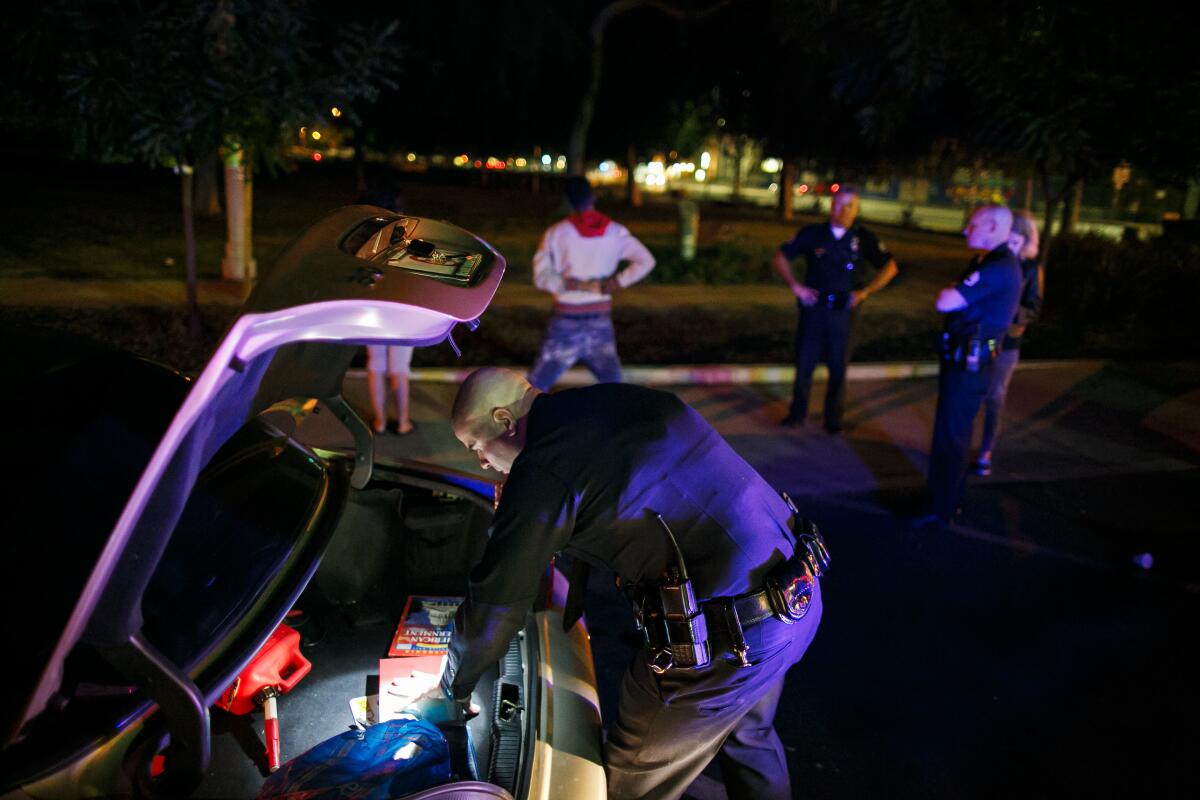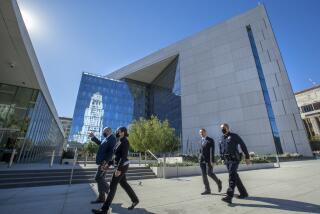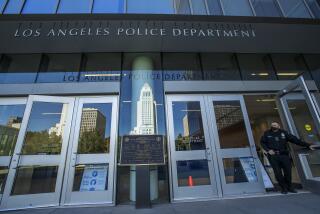New limits on ‘pretextual stops’ by LAPD officers approved, riling police union

Under a new policy adopted Tuesday, Los Angeles police can no longer use minor violations as an excuse to investigate motorists, bicyclists or pedestrians for more serious crimes unless they first have information that justifies the intrusion.
And when officers do make these stops, called “pretextual stops,” they now must record themselves on their body-worn cameras stating their reasons for suspecting a more serious crime has occurred, according to the new rules. Officers who fail to do so will be required first to undergo training and will face increasingly severe discipline for subsequent violations.
The five-member Los Angeles Police Commission unanimously approved the new policy, which takes effect immediately.
The vote was made over objections by the police union that represents rank-and-file officers, which said pretextual stops are critical to ensuring public safety and should not be restricted. Critics of the Los Angeles Police Department also spoke out against the measure, saying these types of stops disproportionately affect people of color and should be banned completely.
Commissioners joined top LAPD officials in arguing the new policy strikes the right balance between those two opposing opinions — limiting such stops without eliminating them entirely.
“This policy is the middle ground,” said Lizabeth Rhodes, director of the LAPD’s Office of Constitutional Policing and Policy.
It is legal for police to stop someone for a minor violation such as a broken tail light and then escalate the encounter into an investigation of something more serious such as drug or weapons possession if officers observe something during the stop that gives them reason to suspect a crime has occurred.
But under the LAPD’s new policy, pretextual stops are allowed only if an officer has “articulable information ... regarding a serious crime” before making them.
The policy does not explicitly define the type or amount of information an officer must have to justify a stop. It says officers are expected to use their “training, experience and expertise” when deciding whether to make a stop and cannot base their decision “on a mere hunch or on generalized characteristics such as a person’s race, gender, age, homeless circumstance, or presence in a high-crime location.”
The policy also states that an officer who has no reason to suspect something more serious is afoot should not make a stop unless the violation “significantly interferes with public safety.” The policy does not define which violations meet that standard.
At the commission meeting LAPD Chief Michel Moore expressed concern that making the policy effective immediately would not give the department time to train officers on how to abide by it and could lead to widespread confusion. Rhodes said it could take until July to sufficiently train all officers on the new policy.
Commissioner President William Briggs said there “is no data that anyone can point to that establishes pretextual stops curtail violent crime in our city” but plenty of it to suggest they undermine public trust in the Police Department — particularly among Black and brown residents, who are disproportionately subjected to stops despite being less likely to have contraband on them.
“The current practice of pretextual stops only serves to alienate whole segments of our community from law enforcement,” Briggs said.
In making his case for the policy change, Briggs cited a 2019 investigation by The Times that found that the LAPD’s Metropolitan Division — tasked with suppressing violent crime — stopped Black drivers at a rate more than five times their share of the city’s population, and that Black and Latino drivers were stopped more often than white drivers despite being less likely to have contraband on them.
Briggs also pointed to a separate review by the LAPD’s inspector general that confirmed The Times’ findings while also finding that such stops were “of limited effectiveness in identifying evidence of illegal firearms or other serious crimes,” with only 2% of traffic stops resulting in an arrest.
Briggs said the Police Commission takes the recent increase in violent crime in L.A. and its responsibility to reduce it seriously but also that “stopping someone for a minor traffic infraction has absolutely no bearing” on such crime.
City Councilman Marqueece Harris-Dawson, who also spoke during the commission meeting, praised the new policy as “a big, big step in the right direction,” saying it “focuses our resources on the most risky situations and the situations that present a very real and articulable public safety threat” while also reducing the likelihood that Black and Latino motorists will be subjected to unjust, racially biased policing.
Several activists who called into the remote meeting rejected that notion, calling the new policy a toothless reform that will simply provide cover for officers to continue abusing Black and Latino people.
Meanwhile, union leaders from the Los Angeles Police Protective League warned the new rules were a threat to public safety. They also claimed the process the commission followed to change the policy violated the union’s collective bargaining agreement with the city and that the union was considering legal options to challenge the new policy.
In a statement, the union said Briggs “should get off his soapbox, do his homework and tell the truth about pretext stops and the important role they play in taking guns off our streets.”
The statement cited data suggesting there were 817 firearms seized during 726 stops in the Newton Division in 2021, and that the seizures “prevented our residents from being shot, shot at, intimidated, victimized and murdered.”
The union did not say how many of those stops were pretextual stops, or what percentage would be precluded under the new rules.
When questioned about the union’s data after the meeting, Briggs provided his own.
Overall in the Newton Division in 2021, he said, police stopped 27,075 people during the course of 20,132 stops. Of those stopped, 64% were Latino and 33% Black. Less than 10% had contraband of any kind, he said, and fewer than 4% had firearms.
In the entire South Bureau, which includes much of South L.A., police made 62,827 stops in 2021 involving 78,829 people, Briggs said. Of those, 58% were Black and 37% were Latino. Firearms were recovered in less than 3.5%, he said.
More to Read
Sign up for Essential California
The most important California stories and recommendations in your inbox every morning.
You may occasionally receive promotional content from the Los Angeles Times.











